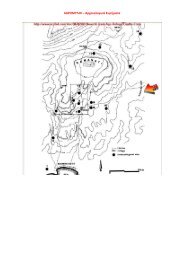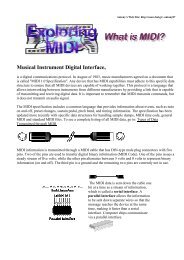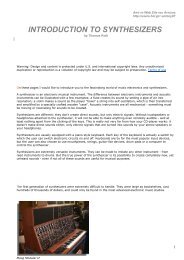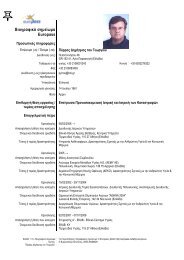Recording Handbook - Hol.gr
Recording Handbook - Hol.gr
Recording Handbook - Hol.gr
You also want an ePaper? Increase the reach of your titles
YUMPU automatically turns print PDFs into web optimized ePapers that Google loves.
good thing can be bad. Too much compression can leave your sound dull<br />
and choppy.<br />
pseo@mail2.sas.upenn.edu (Peter S Seo) writes:<br />
[S]ay you're playing the guitar for instance, and for some reason, the<br />
dynamics (loudness, volume, whatever) of each pluck is different maybe<br />
because you're just really bad at playing guitar. (btw, i'm not<br />
inferring that [only bad guitar players] use compression...)<br />
[Compression will] "smooth" out the signals, the plucking, so that<br />
each pluck will be of the same output level or volume.. it makes the<br />
signal much "tighter" i suppose.. this helps out alot for vocals<br />
too.. but it is something that you the musician have to decide to<br />
use.. maybe you don't want it smooth..<br />
you can also use a compressor to sustain a guitar signal.. though someone<br />
else will have to explain how that works.. all i know is that it does.<br />
benl@mojo.europe.dg.com (Ben Last) writes:<br />
Same way as it sustains everything else: You pick the string. The<br />
note starts, and as it goes on, it gets quieter. Without a<br />
compressor, it'd die away. What the compressor does it to keep<br />
'turning up the volume' so that the note appears to stay the same<br />
level. Eventually, the volume (amplitude) of the note coming from the<br />
guitar gets so quiet that the compressor gives up and turns the volume<br />
92<br />
92
















